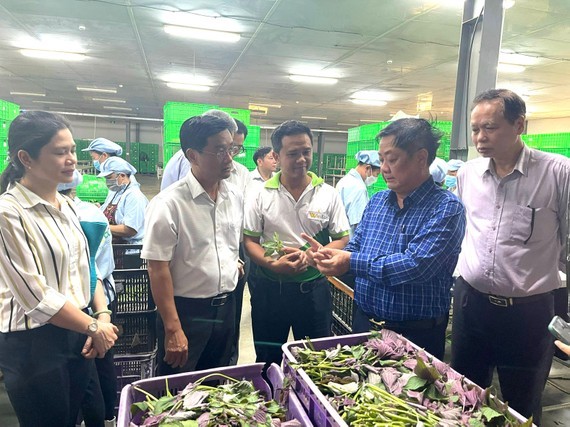
Director Nguyen Nhu Tiep of the National Agro-Forestry-Fisheries Quality Assurance Department (under MARD) said that the domestic food chain has gradually improved from the lacking status to quality maintenance one and now to the transparency, safety assurance.
In the first 9 months of 2022, 99.5 percent of all food processing organizations obtained their food safety certificate, 89 percent small-scaled businesses in the field committed to food safety regulations, nearly 98 percent of monitored samples satisfied food safety requirements, more than 12,500 aquaculture units and 86,300ha of arable, aquaculture land received VietGAP or similar certificates.
Chairwoman of the Vietnam Retailers Association Vu Thi Hau voiced the reason why certain Vietnamese produce has not reached the food safety standards, saying that some farmers and food processing companies still prioritize their profit over food safety. Also, due to their small scale, some enterprises are not capable of implementing advanced updated technologies in food processing.
To address this issue, the State should control the input of the food chain, including the use of fertilizers and pesticides while trying to change farmers’ mindset via closer monitoring of food production.
Dr. Nguyen Thi Hong Minh, Chairwoman of the Transparent Food Association, said that following the VietGAP model would cost more but have a narrower market compared to using the traditional model. It is, therefore, necessary for the State to introduce consistent regulations for the mandatory application of food safety and hygiene among livestock and arable farms. They should allow consumers to obtain information on product origin, plant growing and food processing activities.
Head of the HCMC Food Safety Management Board Pham Khanh Phong Lan stated that her organization encourages food businesses to offer services in schools, hotels, restaurants, supermarkets to apply higher standards compared to applicable laws in this field.
She stressed that it is still challenging for traditional markets and spontaneous ones to adopt these higher standards. Low-quality food might even enter certain food chains as businesses are afraid to ask for the interference of functional agencies when incidents happen. Some employees in supermarkets allow low-quality food into their supermarkets owing to higher profit.
It is rather hard for effective food safety management since her organization can only examine end-products, the other stages being the responsibility of the agriculture sector. A food poisoning case is within the charge of the healthcare sector, while fake products should be dealt with by the market management unit.
Vice Chairman of HCMC People’s Committee Vo Van Hoan commented that food safety is a requirement of the community. However, with such simple food processing procedures, Vietnamese companies cannot upgrade their standards for exportation purposes, and thus this sector of the country can hardly develop.
Therefore, food safety must be maintained in a whole food chain, from seeding preparation to material purchasing, plant caring. Food businesses should financially and technically guide and support farmers in this aspect, while related associations, ministries, and even consumers must monitor food safety strictly, providing suitable proposals for adjustment when needed.
Minister of Agriculture and Rural Development Le Minh Hoan said that sanctions will be imposed to change food safety maintenance in food processing from the encouraging state to compulsory one. MARD will perfect specific standards and regulations, sanctions for this aspect, aiming at satisfying export requirements.
Food safety must be in mind of both consumers and businesses. In addition, food enterprises should consider farmers as their partners, not hired employees
























